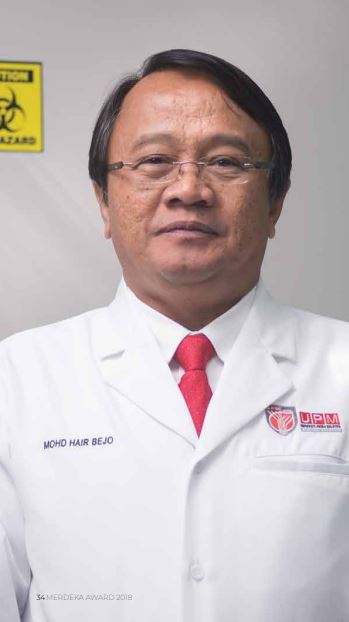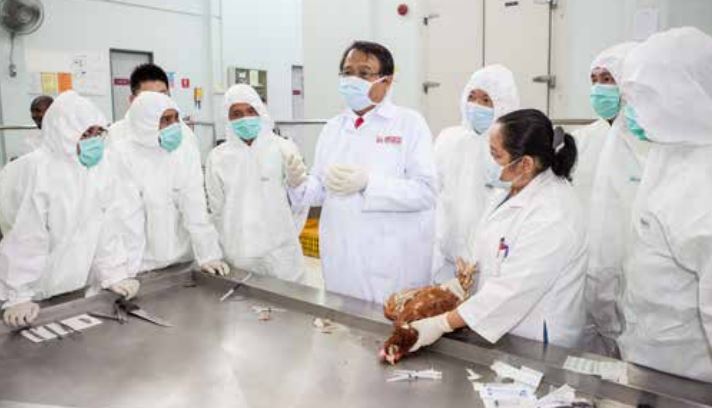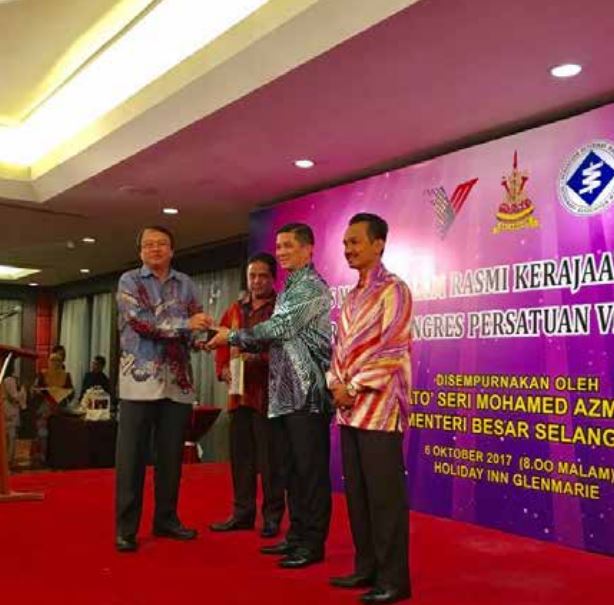
“When you begin to do research, the important thing is to look for what comes after, your contribution to society. No matter what sort of research you plan to do, look towards solving the problems of society.”
- Professor Dr Mohd Hair Bejo -
A Lifelong Dedication to Improving the Health and Quality of Malaysia’s Poultry
Since earning his Doctor of Veterinary Medicine (DVM) from Universiti Putra Malaysia in 1985, Professor Dr Mohd Hair Bejo has established himself as one of the world’s leading experts in the fields of veterinary and avian pathology, as well as animal biotechnology and vaccinology.
In a career spanning more than 26 years, Dr Hair Bejo has contributed to the development of sustainable poultry farming in Malaysia. He was the first Malaysian researcher to diagnose Infectious Bursal Disease (IBD) and Fowl Adenovirus (FAdV) or Inclusion Body Hepatitis (IBH) outbreaks in commercial chickens in 1991 and 2005 respectively, which led to the development and commercialisation of safe and effective vaccines.
From Muar to veterinary mastery
Born in Muar, Johor, Dr Hair-Bejo was inspired to take up the mantle of veterinarian from a young age. After obtaining his Doctor of Veterinary Medicine (DVM) from Universiti Putra Malaysia in 1985, he pursued further education at the University of Liverpool, England, where he earned his PhD in Veterinary Pathology in 1990. Dr. Hair-Bejo's passion for pursuing graduate studies in veterinary pathology stemmed from his profound interest in delving into the fundamental causes of diseases in animals.
Upon returning to Malaysia, he joined UPM's Faculty of Veterinary Medicine as a lecturer of Veterinary Pathology in 1991. During his early years as an academician, Dr Hair Bejo played a key role in strengthening the nation’s poultry industry. He was the first researcher to diagnose the first case of Infectious Bursal Disease (IBD) or Gumboro disease outbreak in Malaysia.
In 1999, Dr Hair-Bejo was promoted to Associate Professor and in 2002, he was offered the position of Deputy Dean (Research and Post-graduate Studies) at UPM’s Faculty of Veterinary Medicine which allowed him a greater opportunity to supervise and lead research teams. In 2007, he was appointed as a full Professor of Universiti Putra Malaysia.

Necropsy on chickens for diagnosis of disease
Dr. Hair Bejo's triumphs in poultry health innovation
This breakthrough vaccine, adopted by the Ministry of Agriculture and Agro-Based Industry, has had a profound impact on Malaysia's poultry industry and is now recognised internationally. In 2017, Dr Hair Bejo received the WVPA-Merial Innovation in Vaccination Award for his outstanding contributions.
Dr Hair Bejo's work reached a pinnacle in 2005 when he successfully developed and commercialised the MyVAC UPM93 IBD vaccine. His team's research and field trials demonstrated its safety and effectiveness in controlling the disease.
Continuing his dedication, Dr Hair Bejo focuses on researching and developing new-generation vaccines to enhance poultry health. He explores the use of green technology and nanotechnology for safer and healthier poultry production, with breakthroughs in cationic liposomes and anolytes. Actively involved in commercialising research products, he also works on bacterial vaccines to reduce antibiotic use, mitigating the risk of antimicrobial resistance.
With an extensive publication record and participation in international conferences, Dr Hair Bejo contributes significantly to scientific literature. His dedication to excellence is reflected in his Scopus, intellectual property achievements, and international recognition.

Anugerah Mengenang Jasa, Veterinary Association Malaysia 2017
Disclaimer:
The information in this award recipient's profile is accurate to the best of our knowledge as of the time the award was presented. Any subsequent changes, updates, or developments in the individual's life or achievements may not be reflected in this profile.